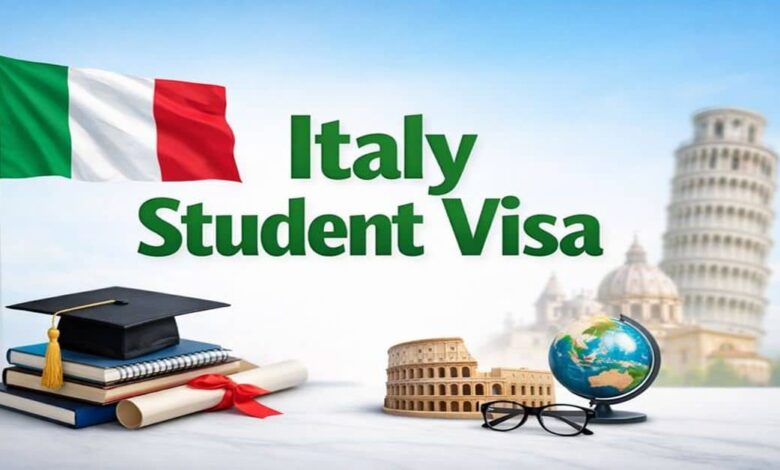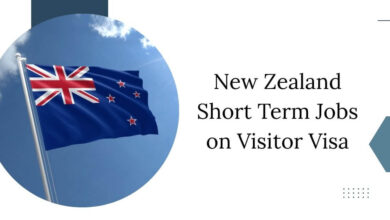Italy Student Visa 2026 – Visa Guide

This is what students need to do if they want to study in Italy for more than three months. Whether you need a visa or not depends on what country you are from. However, anyone coming to Italy to study for more than three months will need to apply for an Italian residence pass. A national or D visa is what you need to study in Italy. This is a long-stay visa that lets you go to Italy.
The Italian embassy or consulate is where you can get a student visa. People from other countries have always loved going to school in Italy. Many Italian grants are open to students from other countries. I’ll list a few of them below. You need to send in your application as soon as possible. A note of acceptance to a school in Italy can help you get a student visa. Here is more information about how to get an Italy student visa and a list of the documents you’ll need.
Who Does Not Need an Italy Student Visa?
People from only the following countries don’t need an Italian Student Visa to enter Italy:
- EU (European Union) countries
- Switzerland
- Norway
- Liechtenstein
- Iceland
Still, people from those countries will need to apply for an Italian Residence Permit three months after they get to Italy. To get an Italian residence pass, you can only do so in Italy.
Who Needs an Italy Student Visa?
People from all the other countries not on this list must first apply for a student visa at the embassy, consulate, or VFS. After that, they will apply for a pass to live in Italy.
Why Long Stay (D Visa is Needed)?
If your program lasts longer than 90 days and you are coming to Italy for college, whether it is an undergrad or grad school, you will usually need a long-stay visa.
Requirements of Italy Student Visa:
- Student Visa Application Form for Italy: Fill out the form and sign it. Most of the time, you can get this form from the website of the Italian embassy or consulate where you want to apply.
- Valid Enrollment/Admission Offer: Show proof that you have been accepted or enrolled at an Italian college or university. This could be an acceptance letter, proof of enrollment, or confirmation of pre-enrollment.
- Passport size pictures: Up-to-date pictures are the size of a passport that meets the special needs of the embassy or consulate.
- Proof of Enrollment or Pre-Enrollment: you need to show proof that you are enrolled or pre-enrolled in an approved course of study at an Italian university.
- Police Clearance Certificate: To show that you have never been convicted of a crime, get a police clearance certificate or something similar from your home country.
- Proof of Accommodation: Show proof that you have a place to stay in Italy. This could be a rental deal, a letter from your host or university confirming where you will stay, or a reservation at a hotel.
- Health Insurance: You must show proof that you have adequate health insurance that is good in Italy for the whole time you are there. This insurance should pay for medical bills, stays in the hospital, and flights back home.
- Educational Documents: Include all important educational documents, such as transcripts, diplomas, degrees, or certificates from schools you have attended in the past.
- Financial Means: Show that you have enough money to cover your expenses while you’re in Italy. This often includes bank statements, letters of recommendation, proof of financial help, or a sponsor’s statement along with their financial documents.
- Visa Application Fee: Pay the fee that is needed to apply for a visa. The fee is different for each type of visa and each country.
Benefits of Italy Student Visa:
- Access to High-Quality Education: Italy is home to some of the world’s oldest and most prestigious universities, which offer a diverse selection of academic programs and degrees.
- Cultural Experience: Students have the opportunity to fully engage with a dynamic culture that encompasses art, music, cuisine, and history by studying in Italy.
- Travel Opportunities: Italy’s central location in Europe facilitates travel to other European countries, offering students the opportunity to experience a variety of cultures and landscapes.
- Work Opportunities: Student visa holders are permitted to work part-time during their studies with a maximum of 20 hours per week in order to assist with their living expenses.
- Health Insurance Coverage: Students are obligated to possess health insurance, which guarantees access to Italy’s public healthcare system and guarantees the availability of medical care when necessary.
- Residence Permit: The student visa permits the application for a residence permit, which enables students to remain in Italy for the duration of their studies.
- Networking Opportunities: Studying in Italy offers the chance to establish connections with professionals and colleagues from various countries, thereby improving one’s future career prospects.
- Language Acquisition: Students are allowed to enhance their Italian language abilities, which can be advantageous for both their personal and professional development.
- Extracurricular Activities: Numerous universities provide a variety of extracurricular programs, such as clubs, workshops, and cultural activities, which contribute to the overall student experience.
- Scholarships and Grants: Certain Italian universities offer financial aid or scholarships to international students, thereby reducing the cost of education.
- Experience Diverse Academic Environments: Italy’s universities frequently have international student communities, which foster multicultural academic environments.
- Pathway to Additional Residency: Graduates may have the opportunity to pursue post-study employment or additional residency options after completing their studies in Italy.
- Enhanced Employability: Completion of a degree from an Italian institution that is recognized can significantly improve one’s employability, particularly in the European and international job markets.
- Student Discounts: Students are eligible for a variety of discounts on transportation, accommodation, and cultural activities, which can help to reduce their overall expenses.
- Interaction with Local Communities: The educational experience is enhanced by the opportunity to engage with local communities and engage in cultural exchange while studying in Italy.
How to Apply for Italy Student Visa?
- To get a visa, you need to fill out an application form, make an appointment on the VFS global website, or check with the Italian office or consulate.
- Always bring the originals of everything with you to your meeting.
- Pay the fee for the visa and send in the paperwork with your passport.
Visa Cost:
A student visa for Italy costs about 50 Euros to apply for. The price might be different for people from different countries.
How to Apply for the Italian Residence Permit in Italy?
You have eight business days from the time you arrive to apply for a residence pass. Bring your passport and other trip papers with you.
Cost of a Residence Permit:
- €40 for stays between 3 and 12 months
- €50 for stays between 12 and 24 months
- €100 for long-term residence permits
Work in Italy during Studies:
You can work twenty hours a week, but not more than 1,040 hours in 52 weeks.
Conclusion:
If you want to study in Italy for longer than three months, you need to plan and follow the rules for visas and living permits. Make sure you have all the papers you need and meet the requirements to study in Italy legally and without any problems.
Frequently Asked Questions:
Who Does Not Need an Italy Student Visa?
Citizens of EU countries, Switzerland, Norway, Liechtenstein, and Iceland do not need an Italian Student Visa but must apply for an Italian Residence Permit within three months of arrival.
Who Needs an Italy Student Visa?
Citizens from all other countries must apply for an Italian Student Visa before coming to Italy for studies lasting longer than 90 days.
How do I get a student visa for Italy?
Non-EU citizens must apply for a student visa at the competent Italian Consulate in their country of residence. For information on the visa procedure, please refer to the online visa portal on the website of the Ministry of Foreign Affairs and International Cooperation: Il visto per l’Italia (esteri.it).




